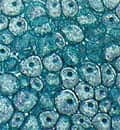In a study involving more than 2,000 children, scientists established that genetic markers on chromosome 17 had a striking effect on the risk of asthma in children.
They also found that these markers altered the levels of a new gene called ORMDL3, which was at a higher level in the blood cells of children with asthma than in those without. The results of the study suggest that the disease-associated version of the gene increases the risk of having asthma by 60% to 70%.
Prof. William Cookson, of Imperial College’s National Heart and Lung Institute in London and who co-ordinated the study, said: “We do not yet know how ORMDL3 affects asthma susceptibility. Similar genes are found in primitive organisms such as yeast, so we suspect that ORMDL3 may be a component of quite ancient immune mechanisms.”
While the discovery is promising, Cookson admitted there was still a lot of work to be done. “[ORMDL3] does not seem to be part of the allergic process. As its expression is increased in asthmatics, it may be possible to develop therapies against it, but this will take some time. "
The prevalence of asthma differs widely from country to country, even within Europe. The researchers carefully structured their investigation to ensure cases of childhood asthma were matched to children without disease from the same geographical areas.








